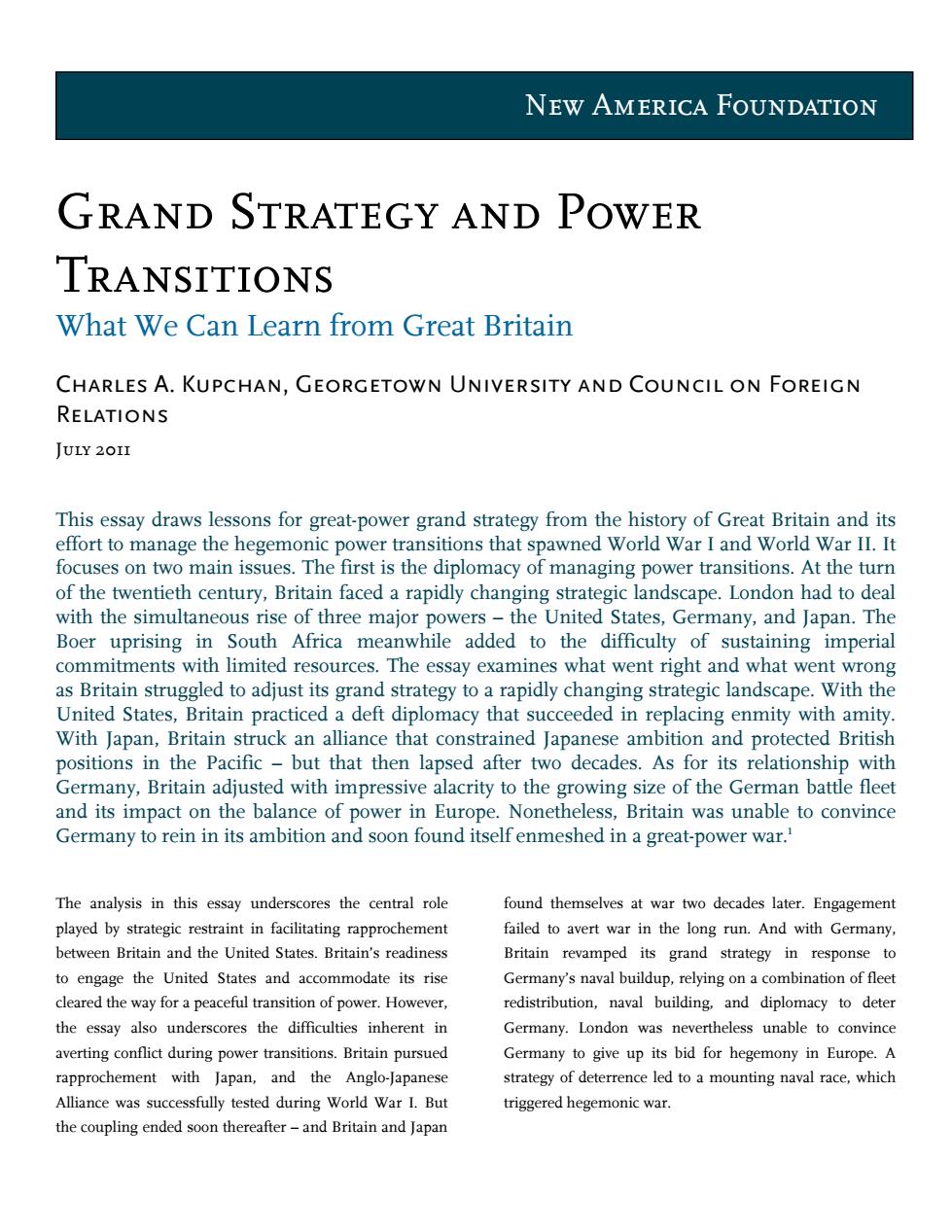正在加载图片...

NEW AMERICA FOUNDATION GRAND STRATEGY AND POWER TRANSITIONS What We Can Learn from Great Britain CHARLES A.KUPCHAN,GEORGETOWN UNIVERSITY AND COUNCIL ON FOREIGN RELATIONS JULY 20II This essay draws lessons for great-power grand strategy from the history of Great Britain and its effort to manage the hegemonic power transitions that spawned World War I and World War II.It focuses on two main issues.The first is the diplomacy of managing power transitions.At the turn of the twentieth century,Britain faced a rapidly changing strategic landscape.London had to deal with the simultaneous rise of three major powers-the United States,Germany,and Japan.The Boer uprising in South Africa meanwhile added to the difficulty of sustaining imperial commitments with limited resources.The essay examines what went right and what went wrong as Britain struggled to adjust its grand strategy to a rapidly changing strategic landscape.With the United States,Britain practiced a deft diplomacy that succeeded in replacing enmity with amity. With Japan,Britain struck an alliance that constrained Japanese ambition and protected British positions in the Pacific-but that then lapsed after two decades.As for its relationship with Germany,Britain adjusted with impressive alacrity to the growing size of the German battle fleet and its impact on the balance of power in Europe.Nonetheless,Britain was unable to convince Germany to rein in its ambition and soon found itself enmeshed in a great-power war.' The analysis in this essay underscores the central role found themselves at war two decades later.Engagement played by strategic restraint in facilitating rapprochement failed to avert war in the long run.And with Germany, between Britain and the United States.Britain's readiness Britain revamped its grand strategy in response to to engage the United States and accommodate its rise Germany's naval buildup,relying on a combination of fleet cleared the way for a peaceful transition of power.However, redistribution,naval building,and diplomacy to deter the essay also underscores the difficulties inherent in Germany.London was nevertheless unable to convince averting conflict during power transitions.Britain pursued Germany to give up its bid for hegemony in Europe.A rapprochement with Japan,and the Anglo-Japanese strategy of deterrence led to a mounting naval race,which Alliance was successfully tested during World War I.But triggered hegemonic war. the coupling ended soon thereafter-and Britain and JapanGrand Strategy and Power Transitions What We Can Learn from Great Britain Charles A. Kupchan, Georgetown University and Council on Foreign Relations July 2011 This essay draws lessons for great-power grand strategy from the history of Great Britain and its effort to manage the hegemonic power transitions that spawned World War I and World War II. It focuses on two main issues. The first is the diplomacy of managing power transitions. At the turn of the twentieth century, Britain faced a rapidly changing strategic landscape. London had to deal with the simultaneous rise of three major powers – the United States, Germany, and Japan. The Boer uprising in South Africa meanwhile added to the difficulty of sustaining imperial commitments with limited resources. The essay examines what went right and what went wrong as Britain struggled to adjust its grand strategy to a rapidly changing strategic landscape. With the United States, Britain practiced a deft diplomacy that succeeded in replacing enmity with amity. With Japan, Britain struck an alliance that constrained Japanese ambition and protected British positions in the Pacific – but that then lapsed after two decades. As for its relationship with Germany, Britain adjusted with impressive alacrity to the growing size of the German battle fleet and its impact on the balance of power in Europe. Nonetheless, Britain was unable to convince Germany to rein in its ambition and soon found itself enmeshed in a great-power war.1 The analysis in this essay underscores the central role played by strategic restraint in facilitating rapprochement between Britain and the United States. Britain’s readiness to engage the United States and accommodate its rise cleared the way for a peaceful transition of power. However, the essay also underscores the difficulties inherent in averting conflict during power transitions. Britain pursued rapprochement with Japan, and the Anglo-Japanese Alliance was successfully tested during World War I. But the coupling ended soon thereafter – and Britain and Japan found themselves at war two decades later. Engagement failed to avert war in the long run. And with Germany, Britain revamped its grand strategy in response to Germany’s naval buildup, relying on a combination of fleet redistribution, naval building, and diplomacy to deter Germany. London was nevertheless unable to convince Germany to give up its bid for hegemony in Europe. A strategy of deterrence led to a mounting naval race, which triggered hegemonic war. New America Foundation